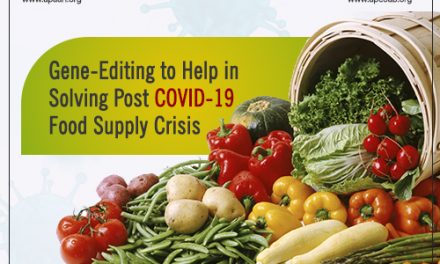The major worry for the agriculture biologists around the world is about running out of food stock while feeding the ever-growing population, which is estimated to rise to 9.7 billion globally by 2050.
The efficient use of innovative technologies like gene editing can bring about changes in the way farmers grow food. Yet, the technology has to meet various challenges of acceptance and regulations to come full-fledged. The innovation of CRISPR-Cas9 allows breeders to develop disease-resistant, climate-resilient crops for the farmers. With the growing world population and environment being abused by manipulative human habits of survival, climatic conditions are worsening with more carbon emissions, degraded soils, poor photosynthesis, impurity and paucity of water etc. It all has a direct impact on the health of the plant, hence, developing climate-resilient varieties are a futuristic step towards overcoming challenges posed by unprecedented changing climatic conditions.
The following can prove beneficial in sustaining climate resilience in agriculture through the use of innovative CRISPR-Cas9 technology:
Land health
Maintenance of farmland to protect the land from deteriorating in terms of essential nutrients can help in producing the high quality of yield. However, the maintenance gets affected with prolonged use of fertilizers and other chemical applications. Researchers are engineering microbes within the soil to direct key nutrients to the plants. Also, nutrient efficient crop varieties are being developed to reduce the use of synthetic fertilizers.
Less is more
With the growing trend of population, the land for cultivation keeps shrinking. This will become even more prominent as the growth continues. Hence, to meet the food demands, gene-editing technology- CRISPR can enhance plants to thrive and yield better with shorter life cycles. The technology can also support innovative ways of farming like indoor farming.
Resilient crops
Every year more than half of the cultivated crops don’t get to be sold in the market or reach consumer plates due to on-field losses. Climate change is persistent and so does the adverse climatic effect on the growth of plants. Common crops like rice, wheat, coffee, banana, and oranges etc are already becoming prone to diseases which gets worsen due to warmer climates. Ongoing research will allow, through gene editing disease-resistant crops to be developed to manage the pest infestations that have spread due to climatic conditions. The concept of developing disease resistance and climate-resilient traits is not new in breeding but being capable of doing it in a fraction of time as compared to conventional approaches makes it a revolution worth considering in the world of biosciences or agricultural science.


